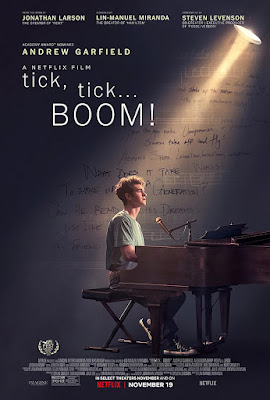A version of this review originally appeared in the church newsletter of the First Presbyterian Church of Delray Beach
But it’s in his third film that we perhaps get the fullest picture of Miranda as both artist and human being. An adaptation of Jonathan Larson’s musical Tick, Tick…Boom!, Miranda could not have found better material for his directorial debut. Loosely based on Larson’s loosely autobiographical rock monologue, the film follows Larson (Andrew Garfield) as a struggling Manhattan songwriter trying to finish and put on his debut musical while fighting with self-doubt and frustration over his lack of artistic success. In many ways Larson’s story parallels Miranda’s own: both were musical prodigies from New York, both came from minority backgrounds, both became protégés of legendary playwright Stephen Sondheim, and both produced unexpected hit musicals that shattered and rebuilt the modern musical in their own image—Larson’s Rent (1996) and Miranda’s Hamilton (2015).
The main difference between Larson and Miranda, however, was that Miranda lived to see his own success. On the morning of Rent’s premiere performance Larson died of an undiagnosed heart condition. He was only 35. Miranda’s film, therefore, feels haunted by a strange sense of survivor’s guilt. Larson was unquestionably a genius, but the film is almost over-enthusiastic in its portrayal of him as a misunderstood wunderkind who could summon great songs out of thin air. Miranda’s eagerness to fête his hero comes to a head in a sequence set in the real-life Moondance Diner where Larson once waited tables. Originally a loving riff on mentor Sondheim’s Sunday in the Park with George, Miranda unmoors it from its original context, reworking it as a posthumous tribute to Larson crammed full of cameos from Broadway royalty like Bernadette Peters. It was undoubtably a sweet and sincere move, but it inadvertently backfires by making the song the film’s only unnecessary and inconsequential scene.
Or does it? If Larson’s musical was originally about seizing the day in the face of fears of failure and wasting one’s life, Miranda’s adaptation seems to redirect it towards the central theme of Larson’s masterpiece Rent: the importance of love. Over the course of the film Larson alienates everyone close to him as he pursues his art. He convinces himself that he’s too busy working on his musical to visit his friend and coworker Freddy (Ben Levi Ross) in the hospital as he struggles with AIDS. He drifts away from his childhood friend Michael (Robin de Jesús), contemptuous of his “selling out” by abandoning his career as an actor for a cushy office job. Finally, he emotionally neglects his girlfriend Susan (Alexandra Shipp) so badly that she breaks up with him and moves away from the city.
Thankfully Larson realizes what he’s done and reconciles with everyone as he prepares for the next stage in his career. But this hopeful denouement is short-lived. The bittersweet postlude revealing Larson’s sudden death recontextualizes the entire musical as being not about artistic perseverance but the proper prioritizing of people and relationships over everything else. Once again, it all comes back to love—maybe the “Sunday” number was unnecessary, but it was an act of love, much like Miranda’s decision to direct the film in the first place. Perhaps this version of Tick, Tick…Boom! wouldn’t have been complete without such a grand gesture. It certainly sets it apart from other adaptations of stage musicals too terrified to veer from the source material to say or do anything original. And therein lies the magic.
No comments:
Post a Comment